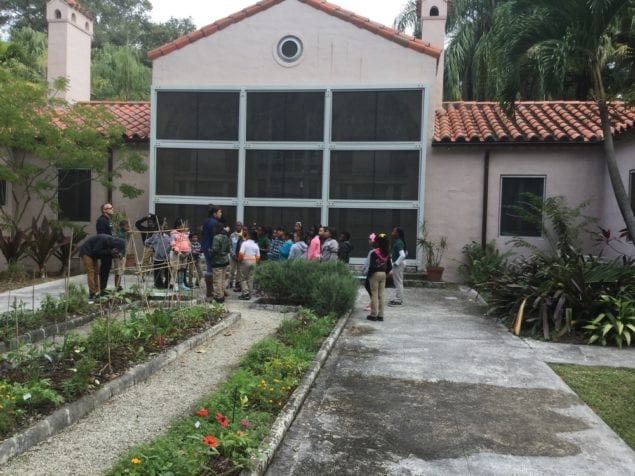
(Photo courtesy of Vizcaya Museum and Gardens)
Vizcaya Museum and Gardens’ Urban Farming School Program has been awarded the 2019 EdCom Award for Innovation in Museum Education by the American Alliance of Museums.
This award recognizes, encourages and celebrates innovation in museum education. Candidates had to clearly address one or more of the challenges cited in the Center for the Future of Museums’ Building the Future of Education: Museums and the Learning Ecosystem or respond to broad trends in education and museum education.
Vizcaya’s Urban Farming School Program explores: connections between people, edible plants and place through the Vizcaya Village and Vizcaya’s onsite Kitchen Garden; the comprehensive seed-to-table cycle, and farming in Miami-Dade County, including issues of sustainability. These broad topics examine current agricultural practices, environmental stewardship and nutritional health.
In collaboration with local Miami-Dade County Public Schools, the Urban Farming School Program begins with a Teacher Professional Development Workshop at the beginning of the school year. Participating teachers return to Vizcaya free of charge with their students for hands-on learning in the Vizcaya Village and Kitchen Garden.
Lesson activities examine and dissect various parts of edible plants and map the journey of common fruits and vegetables from their place of origin around the world to Miami. Journey mapping demonstrates the carbon footprint and environmental impact of transporting foods to our community. These lessons develop knowledge about harvesting and using fruits and vegetables for nutritional health, and demonstrate how we can reduce carbon footprints by growing locally.
Vizcaya’s Urban Farming School Program introduces students to the estate’s farming past, examines urban farming in Miami’s urban core and raises considerations to shape a healthier future, for our community and our environment.
“Vizcaya’s program is innovative in two ways: it is a comprehensive and holistic presentation of a topic based in Vizcaya’s rich agricultural history and legacy, and the program is implemented in partnership with local schools by connecting with Miami-Dade County Public School’s initiative for STEAM Designation,” said Diana Pena, Vizcaya’s School Programs manager.
By building deeper connections with Miami-Dade County Public Schools and by supporting their STEM and STEAM curriculum, Vizcaya programs build capacity in local schools and advance their efforts to achieve STEAM designation. Additionally, Vizcaya’s Urban Farming School Program meets teacher certification and professional credit needs. The Urban Farming School Programs are free, including bus transportation to the estate, promoting equitable access and eliminating barriers to participation.
Vizcaya’s Urban Farming School Program will grow, along with the Vizcaya Village in coming years. This program is a cornerstone of Vizcaya’s plans to open and restore 12 acres and 11 historic buildings to engage the community to connect with the past, understand the present and shape the future, and to embrace the cultural vitality and environmental sustainability of the world around us.
To learn more about Vizcaya’s Urban Farming School Program visit vizcayalearning.weebly.com or contact learning.programs@vizcaya.org.
Located on Biscayne Bay at 3251 S. Miami Ave., Vizcaya is open Wednesday through Monday from 9:30 a.m. to 4:30 p.m. Closed Tuesdays, Thanksgiving Day and Christmas Day. For more information, visit www.vizcaya.org, connect via social media, or call 305-250-9133.







Thank you for sharing the great news and recognition of Vizcaya’s work in STEM, STEAM, urban farming, and issues related to environmental impact and our carbon footprint.